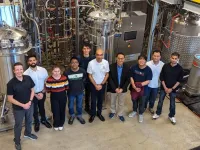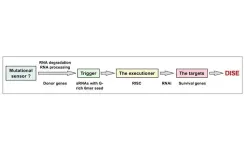(Press-News.org) The the latest data on universal screening for type 1 diabetes (T1D) is reveiwed in a session at this year’s Annual Meeting of the European Association for the Study of Diabetes (EASD) in Hamburg, Germany (2-6 October). The talk will be given by Dr Emily K. Sims, Associate Professor of Pediatrics, Center for Diabetes and Metabolic Diseases, Indiana University School of Medicine, Indianapolis, IN, USA.
Research by various groups has established that individuals with multiple islet autoantibodies (biomarkers showing that the body is attacking and killing its own insulin producing beta cells in the pancreas) have a near 100% risk of developing T1D over their lifetime (Ziegler et al. JAMA. 2013 Jun 19;309(23):2473-9). Multiple groups including Ezio Bonifacio and colleagues from the TEDDY Consortium (Diabetes Care 2021) and Ghalwash and colleagues from Type 1 Diabetes Intelligence Study Group (The Lancet Diabetes & Endocrinology 2022) have shown that screening for islet auto-antibodies at two ages – 2 and at 5-7 years - would predict most cases of type 1 diabetes that would develop by age 15 years.
Dr Sims will highlight that, although screening programs have previously most often focused on people with family members with T1D (who can have up to 15 times increased risk of developing T1D), most people who develop T1D (85-90%) have no family history of the condition. “Our knowledge of type 1 diabetes has now evolved from thinking it is a disease that suddenly develops, to knowing that it is something that gradually develops, after the appearance of multiple islet-autoantibodies. By screening children and adults to identify individuals with early, presymptomatic stages of disease, we can more accurately predict when they will first need insulin and prevent life-threatening DKA episodes that otherwise frequently occur at diagnosis,” she explains. “Natural history studies have shown us that once someone has reached the threshold of multiple islet autoantibodies, progression occurs similarly in relatives and those with no family history.”
Knowing who is likely to develop T1D will help prevent cases of diabetic ketoacidosis (DKA) that occurs when the body doesn't have enough insulin to allow blood sugar into the cells for use as energy. Instead, the liver breaks down fat for fuel, producing acids called ketones; the build-up of these ketones to dangerous levels causes DKA. These episodes can be dangerous and even fatal, causing a number of uncomfortable symptoms. The symptoms of DKA can be the first sign of T1D in people who haven’t yet been diagnosed.
Various research programs are going on worldwide to establish the best ways of implementing universal screening, including programmes in Germany, the USA, Israel, the UK, and Australia, and a new program (Edent1fi) has just been funded that is going to include multiple new countries in Europe, including the UK, Germany, Poland, Portugal, Italy and the Czech Republic. “These are all research programs. The next steps before universal screening for type 1 diabetes becomes general policy will require guidelines for monitoring and endorsement of screening and monitoring guidelines by applicable societies,” explains Dr Sims. This will also be helped by broader access to disease modifying therapies to impact progression and the need to start insulin injections.
She explains that these research programmes are in many cases working with primary care doctors to obtain blood testing for autoantibodies - while some of them work through newborn screening (genetic testing performed on infant blood spots followed by antibody screening in individuals at higher genetic risk).
Dr Sims says: “The costs of screening, optimal ways to scale it up, and how to connect it with access to disease modifying therapies, such as the monoclonal anti-CD3 antibody that was recently FDA-approved in the US for delay of Stage 3 T1D in individuals meeting criteria for Stage 2 disease (multiple islet autoantibodies and changes in blood sugar), are all still to be worked out. Other important considerations moving forward include reaching traditionally understudied populations and more tailored approaches for individual patients.”
As the question of when we could see universal screening for T1D rolled, Dr Sims concludes: “ I think we will start to see increasing society endorsement of screening and monitoring guidelines over the next five years and that as this occurs, countries will start incorporating screening into routine care for young children at the general practitioner’s office – for example, when children are called for routine childhood vaccinations.” Screening for adults, who can also develop T1D, is less well studied. Although optimal approaches have yet to be clearly elucidated, this population will also likely benefit from identification of early stage disease and the advantages of education, monitoring, and access to therapy.
“Given that we know that individuals without a family history are the most likely to present with new T1D and that once they reach criteria for early stage disease, they are at similar risk to individuals with a family history, universal screening the of general population is key to ultimately allow the most individuals to benefit from access to education, monitoring, and disease modifying therapies.
Dr Sims will also take part in the embargoed press conference taking place at 1200H Noon CEST Hamburg time on Tues 3 Oct, in the Vienna Hall.
To join by zoom, use this link
https://us06web.zoom.us/j/86523053998?pwd=0CxM4PetJCn8K6CbnavJVbp3uIZ3aa.1
For press conference slide presentation, click here
END
Is universal screening for type 1 diabetes around the corner?
2023-10-04
ELSE PRESS RELEASES FROM THIS DATE:
Metabolic signature can help predict which smokers will develop type 2 diabetes
2023-10-04
New research being presented at this year’s Annual Meeting of The European Association for the Study of Diabetes (EASD), Hamburg (2-6 Oct) finds that cigarette smoking increases the risk of developing type 2 diabetes in part by affecting a variety of metabolites—small chemicals produced in the processes of metabolism—that circulate in the bloodstream.
The influence of these metabolic changes on diabetes risk appears to be amplified in individuals with genetic susceptibility to type 2 diabetes or insulin resistance.
The analysis of over 93,000 UK Biobank participants also identified a metabolic ...
Metabolically healthy obesity: fact or fiction?
2023-10-04
A session at this year’s Annual Meeting of the European Association for the Study of Diabetes will explore the latest data on the concept of metabolically healthy obesity (MHO) – more commonly known by the public as ‘fat but fit’. Professor Matthias Blüher, University of Leipzig, Leipzig and Helmholtz Center Munich, Germany will explain how we define MHO and ask if it can really be described as healthy.
“Some 15-20% of people living with obesity have none ...
Emergency department screening could detect thousands of undiagnosed prediabetes and diabetes cases, UK study suggests
2023-10-04
The introduction of screening for type 2 diabetes in Accident and Emergency (A&E) departments could uncover thousands of previously undiagnosed cases every year, suggests new research being presented at this year’s Annual Meeting of The European Association for the Study of Diabetes (EASD), Hamburg (2-6 Oct).
“Early diagnosis is the best way to avoid the devastating complications of type 2 diabetes, and offers the best chance of living a long and healthy life”, says Professor Edward Jude, Tameside and Glossop Integrated Care NHS Foundation Trust, UK. “Symptoms of type 2 diabetes may be absent and can be tricky ...
New stem cell-derived islet therapy improves blood sugar control in all treated patients, with three achieving insulin independence
2023-10-04
Six adults with type 1 diabetes (T1D) treated with stem cell-derived islet cells (VX-880) have shown improved blood sugar control with three participants achieving insulin independence, according to new research being presented at this year’s Annual Meeting of The European Association for the Study of Diabetes (EASD), Hamburg (2-6 Oct).
All patients treated with VX-880 have demonstrated improved glycaemic control, as evidenced by elimination of severe hypoglycaemia (low blood sugar), improvements in HbA1c (a measure of long-term sugar levels) and the amount of time their ...
New pipeline makes valuable organic acid from plants — saving money and emissions
2023-10-03
In a breakthrough for environmentally friendly chemical production, researchers at the Center for Advanced Bioenergy and Bioproducts Innovation (CABBI) have developed an economical way to make succinic acid, an important industrial chemical, from sugarcane.
The team of University of Illinois and Princeton University researchers created a cost-effective, end-to-end pipeline for this valuable organic acid by engineering a tough, acid-tolerant yeast as the fermenting agent, avoiding costly steps in downstream processing. Succinic acid is a widely ...
PARMESAN: An AI-based predictive tool to find new treatments for genetic disorders
2023-10-03
To discover new treatments for genetic disorders, scientists need a thorough knowledge of prior literature to determine the best gene/protein targets and the most promising drugs to test. However, biomedical literature is growing at an explosive rate and often contains conflicting information, making it increasingly time-consuming for researchers to conduct a complete and thorough review.
To address this challenge, Cole Deisseroth, a graduate student enrolled in the M.D./Ph.D. program and mentored by Drs. Huda Zoghbi and Zhandong Liu at the Jan and Duncan ...
PPPL awarded $5 million to lead an Energy Earthshot Research Center focused on clean hydrogen
2023-10-03
Lessening the effects of climate change will require a variety of innovations and a lot of ingenuity. Now, a new center led by the U.S. Department of Energy’s (DOE) Princeton Plasma Physics Laboratory (PPPL) will help these efforts by advancing the understanding of plasma-based clean hydrogen production.
PPPL was selected to lead a DOE Energy Earthshot Research Center (EERC) as part of the Hydrogen Shot™, which aims to reduce the cost of hydrogen by 80%. With funding from the DOE’s Office of Science, the EERCs support fundamental ...
Illinois-led project to sequence 400 soybean genomes, improve future crops
2023-10-03
As a source of protein and biodiesel for cleaner renewable energy, soybean is an important crop worldwide. But is it performing to its full potential? An ambitious effort led by the University of Illinois Urbana-Champaign and the U.S. Department of Energy Joint Genome Institute (JGI) will sequence 400 soybean genomes to develop a “pangenome” — an attempt to characterize all the useful diversity in the genome to create an even more robust and resilient crop.
The soybean pangenome project will sequence and analyze at least 50 soybean genomes from cultivated lines and wild relatives at reference quality, the gold standard of modern sequencing. A further ...
An ancient anti-cancer mechanism: DISE
2023-10-03
“DISE is effective against all cancers we tested.”
A new editorial paper was published in Oncotarget's Volume 14 on September 25, 2023, entitled, “DISE, an ancient anti-cancer mechanism that senses mutational load in cancerous cells?”
In their new editorial, researchers Monal Patel and Marcus E. Peter from Northwestern University discuss a recent breakthrough in cancer therapy. Despite the multiple advances in therapy, cancer remains one of the most common causes of death globally. ...
Project aims to develop all-in-one semiconductor that stores, processes data
2023-10-03
A multi-institutional project led by a Penn State researcher is focused on developing an all-in-one semiconductor device that can both store data and perform computations. The project recently received $2 million in funding over three years as part of the new National Science Foundation Future of Semiconductors (FuSe) program, a $45.6 million investment to advance semiconductor technologies and manufacturing through 24 research and education projects across the United States.
“The goal of ...



